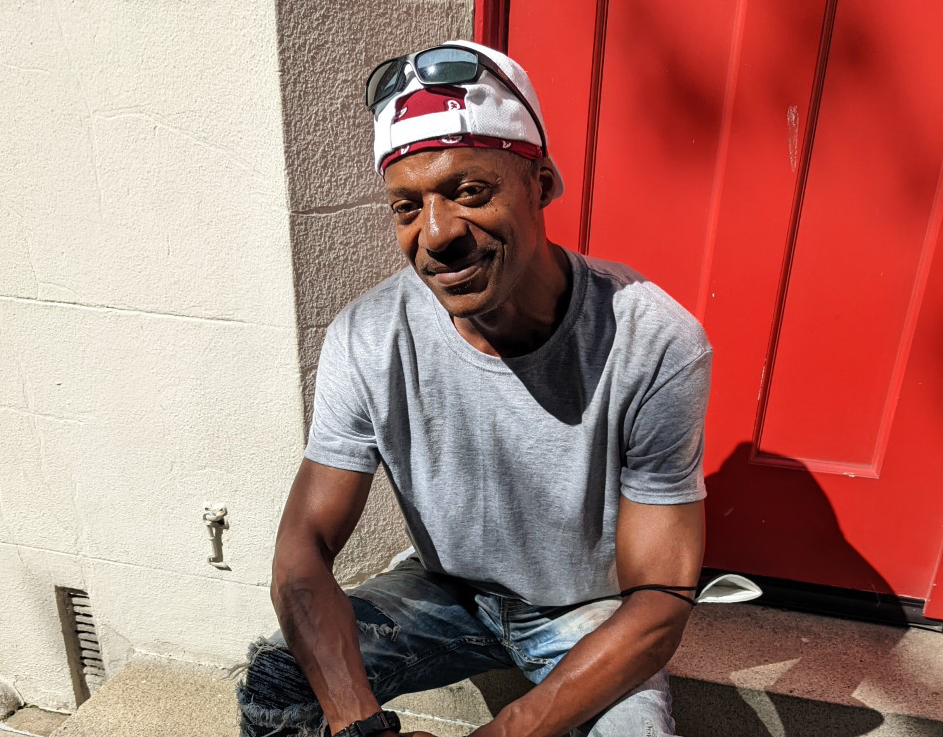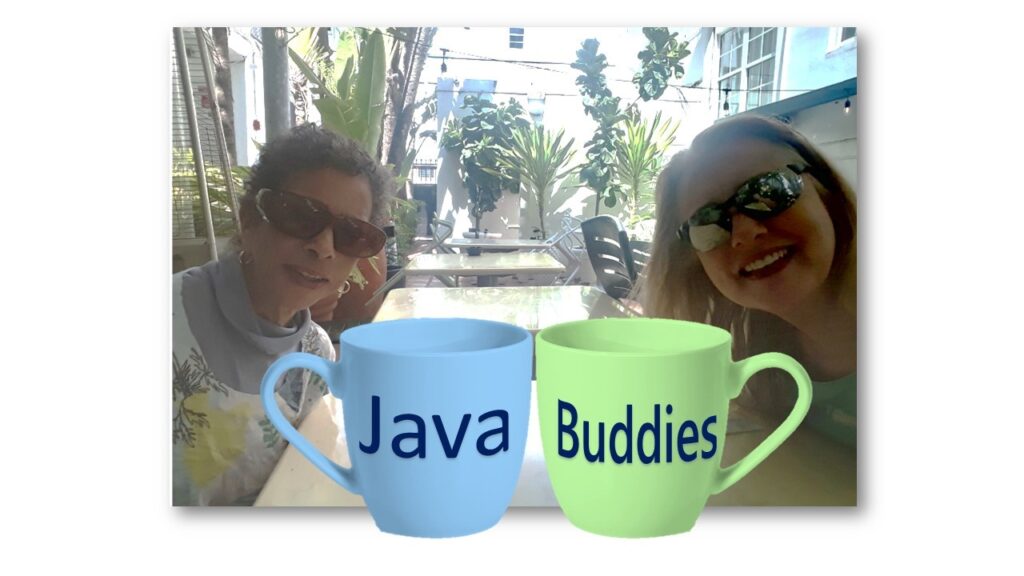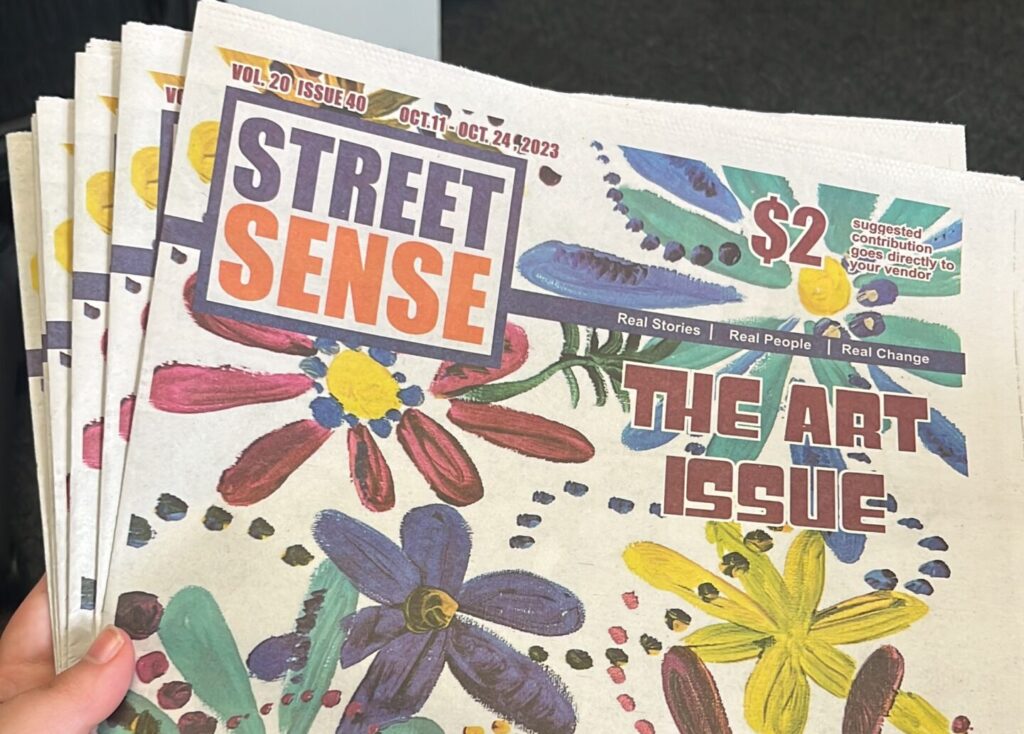Andre Brinson, 54, an artist and vendor with Street Sense Media, never imagined he would ever grow up without having a place to live. He lived a relatively comfortable life, working jobs where he made enough money for what he needed. It was not until he reached his early twenties that he would experience homelessness for the first time, sleeping out on the streets in the Georgetown neighborhood of Washington, D.C., on a frigid Christmas Eve.
“When I woke up, I couldn’t feel my legs,” he said. “I’m surprised I woke up, really, I probably almost froze to death.”
He spent the following 30 years wrestling on and off with homelessness. In 2010, he met another vendor, Phillip Black, aka “Cat in the Hat,” who encouraged him to sell papers with Street Sense Media. Over the years, Brinson has worked as a cook and delivery driver while writing for and selling the paper. This past November, he moved into an apartment and has been adjusting to his new routine.
Street Sense recently caught up with Brinson, who wanted to relate his thoughts about homelessness and his experience with it to readers.
This conversation has been edited for length and clarity.
Can you tell us about yourself?
Well, I’m 54 years old. And I’ve been experiencing homelessness for a little while, almost 20 years. But while I was homeless, I worked while I was living on the streets, you know? I worked temporary jobs and stuff like that. Besides that, I have a nice family and I don’t impose on them too much.
Years ago, I had a drinking problem from being on the streets even though I’m not really a drinker. Actually, I started drinking just because it was cold. I was told “Man, drink some of this, it will help you get through the night.” So that’s how basically I was managing the cold.
Sometimes, people will say all homeless people are either on drugs or drinking or whatever. But let me put it this way —if you was out there, dealing with a situation like that, you gonna do something. Because there’s people out there who have regular jobs, and they have to get their little drink on after work.
It sounds like you’re saying that having a drinking problem has nothing to do with homelessness. Is that right?
No. But see, that’s the first thing people will automatically think when they see a homeless person. They’re automatically thinking, “Oh, they out here because they on drugs and this and that.” And that’s not totally correct. Well, they might have developed something while they’ve been out there, but everybody has their own little issues. Now, some people say, people choose to be outside and to be homeless. I can’t really get that through my mind, this idea that someone chooses to live on the streets. I don’t think so.
You said you never thought you’d ever experience homelessness. Can you tell us why?
Well, I was a pretty decent dude when I was younger. You know, I grew up in the hood. And I ain’t saying that just because you grew up in the hood, you’re going to deal in certain things. But that’s what I knew. I knew how to maneuver. I knew how to deal this and deal that. And anyhow, I was living pretty good. I had a three story house, I had cars and all that. But I lost it all. I eventually did time [in prison].
But at the same time, I do have skills. I have cooking skills, I have maintenance skills, because I went to Job Corps. Job Corps really is something because Job Corps really saved my life.
What is Job Corps?
Job Corps is a program to help youth that’s having problems in school. You go there for two years, but that’s if you can make it to two years. You might have all kinds of issues such as anger problems, but they don’t allow that.
I always beat the odds. People always had this thing about me. I was always like the black sheep. And they always give me the odds of “Nah, he ain’t ever gonna make it.” But I always beat the odds. When I first got into this program, they said, “He’s not gonna make it, not even a month.” I did the whole two years.
When did you get connected with Street Sense? You were one of the originals, right?
I’m almost like one of the originals. I’m next to the originals. Cat in the Hat [Vendor and artist Phillip Black] is the one who told me about Street Sense. He used to see me all up and down Wisconsin Avenue, I would just be doing my little hustling thing. And throughout the day, I would make nice little change.
But Cat in the Hat was the one who was like, “Dre, Why don’t you get into Street Sense?” So I was like, “Why not? I’ll do it.” After I got to Street Sense, I helped them grow. Eight or nine people that’s doing Street Sense right now is because of me. After I started doing it, I started putting them on it.
What’s the benefit of working at a place like Street Sense?
Everyone has a story. I always say that if you living, you have a story. It could be good and bad, whatever. But at the same time you have a choice to tell your story. And I enjoy telling my story. In fact, I’m writing a book and my book is definitely going to be a movie someday.
After some of the things that happened in my life, I’m surprised I’m sitting in this room talking to you now. Every day is a blessing for me because I already know that I really, probably, shouldn’t even be here right now. I’ve been in some rough, rough situations. And I also did things to myself. But I also always come through.
What kind of advice do you have for people that are going through a rough time right now?
Don’t give up. You see, when people give up, they give up mentally. I know that some people have mental illnesses. But some people will just give up . You know, actually I did. That’s why I stayed out there [on the streets] so long. I got so used to being out on the streets. Or let’s put it this way, I adapted.
But you have to think, “This is not how my life is supposed to be. I ain’t supposed to be living on no streets.”
Is there anything else you’d like to share with readers?
Truthfully, I don’t have to be selling newspapers. Selling these papers keeps me humble. You know, despite the looks and whatever people might think because I’m selling the paper or dealing with homelessness. It really keeps me humble.
I could be out here making some money the wrong way. I could do it real fast. It’s just a phone call away. But I don’t because I already done experienced too much trauma. I done been in too many terrible situations. Here I can just be selling the paper and don’t have to worry about the police or nothing like that.








